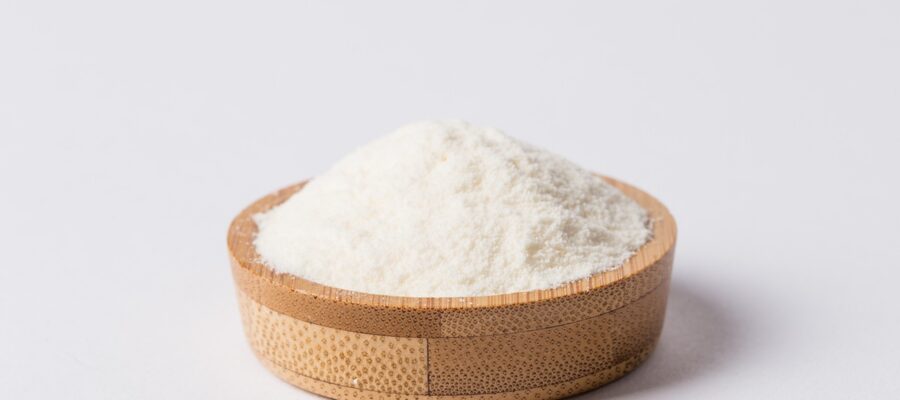Whey protein is a very popular dietary supplement that can be used for muscle growth, weight-loss, and is also used in many meal replacement shakes. It is very easy to digest, and has a multitude of benefits that most people don’t even realize.
Some of these benefits include: anti-inflammatory, immune-boosting and antioxidant, as well as potential anti-cancer and anti-tumor properties.
However, whey protein is not for everyone, especially those on the Autoimmune Protocol diet (AIP), as well as those who have a dairy allergy or a sensitivity to dairy.
What is Whey Protein?
Milk has two components: Casein and whey. Whey is the liquid that you see when you open a container of yogurt, or cottage cheese.
Pure whey contains all of the essential amino acids, branch chain amino acids (BCAAs), vitamins and minerals, such as B12, pantothenic acid (Vitamin B5), magnesium, potassium, zinc, calcium and selenium.
Whey also contains:
- Lactoferrin – An important component of our immune system and can reduce our risk of infections and susceptibility to sickness.
- Glycomacropeptides – Antimicrobial, can help with cavity prevention, and can also help the body fight infection and disease.
- Alpha lactalbumin – Supports a healthy microbiome, and helps to prevent intestinal infections.
- Beta lactalbumin – Supports muscle building.
- Immunoglobulin G (IgG)– Supports the immune system, beneficial for gut health.
Types of Whey Protein Powders
Whey protein concentrate contains a combination of proteins, carbohydrates (from lactose), and some nominal fat. It is more nutritionally balanced and is typically is not as highly processed as its counterpart.
Whey protein isolate is highly processed with heat in order to isolate the protein content, which can make it more difficult to digest and also have a negative effect on the protein and nutrients.
During this process, the carbohydrates, fats, any vitamins and alkalizing minerals that might have been present are taken out of the powder, leaving a composition of mostly protein. This is why weightlifters and bodybuilders tend to gravitate towards whey isolate.
If you want to supplement with whey protein powder, a concentrate is typically a much better choice.
How is your protein powder processed?
There are also different processing methods used to separate the whey from the casein. Some are better than others.
Whey is typically processed through ion exchange or membrane filtration.
Ion Exchange
Ion exchange is a method that uses chemicals to adjust the pH and the electrical charge on the proteins in order to separate them.
The protein is collected and all the other macronutrients pass through.
This is the least effective method to process whey, as it strips the whey of all of its fats, vitamins, and minerals. This process can cause the protein structure to change, as well as effect protein and mineral absorption.
This is the method used to make whey protein isolate, and this is not the kind of protein that you want in your shake!
Membrane Filtration
Membrane filtration is a cold temperature processing method. This method does not use chemicals and allows the protein structures to stay in tact – which is a good thing.
Membrane filtration uses a filter with different pore sizes that allows the carbohydrates and minerals in raw whey to pass through.
Compared to the ion exchange method, this is much better, as many of the nutrients are retained. This is the method typically used to make whey protein concentrate.
Other Considerations With Whey
A few more important qualities to look for in your whey powder are:
Grass-fed. If the whey is not grass-fed, the cows are likely eating genetically modified corn and soy, which changes the nutritional profile of the whey.
Additionally, grass-fed animal products have higher levels of conjugated linoleic acid (CLA), which some studies show may prevent tumor growth.
Antibiotics. Many animals raised on large concentrated animal feeding organizations (CAFO), nicknamed “factory farms”, are living in cramped, inhumane and unsanitary conditions.
Because of these conditions, and also the low quality of their feed, disease often spreads quickly among the animals. As a preventative measure, many farmers regularly give their animals antibiotics.
According to the CDC, this has helped to contribute to strains of antibiotic-resistant bacteria. Additionally, the manure produced from these animals contains a variety of pollutants, including antibiotics, growth hormones, and pathogens, such as E. coli. This manure can pollute the groundwater and also change the quality of soil.
Recombinant Bovine Growth Hormone (rBGH). The FDA approved this genetically engineered hormone in 1993 to increase the milk production in cows. It was banned in many other countries, including the European Union.
After its introduction, there was a significant rise in mastitis among cows, which led to increased antibiotic use. Also, some studies have shown that cows treated with rBGH have higher levels of the natural Insulin-like Growth Factor-1 (IGF-1), which regulates cellular division and growth throughout life. This is worrisome because it “ may influence the development of certain tumors.”
Dairy sensitivities. Although raw and grass-fed dairy products contain a host of nourishing vitamins, mineral, fats and enzymes, we must remember that ultimately, milk is a substance biologically intended for baby calves.
Because of this, many of us have sensitivities to dairy. For some, especially those who have been diagnosed with “lactose or casein intolerance”, the symptoms are more severe. However, some of us have more innocuous symptoms, such as a stuffy nose, joint pain, acne, and gas.
This is where it becomes important for us to observe any symptoms or bodily reactions that we have after eating or drinking dairy. If you suspect that you have a sensitivity, you may want to consider removing dairy for 21 days and observing how you feel. Then reintroduce it and observe whether or not you have any symptoms.
Final thoughts
At the end of the day, whey protein powder isn’t for everyone, but studies have shown some great benefits for those of us who can tolerate it.
Remember to read the labels and buy the best quality that you can afford.
Join Me for an Autoimmune Insight Session
Ready to take control of your autoimmune disease and find relief from your symptoms? My signature 6-month program, Autoimmune Harmony will provide you with expert support and guidance, a personalized wellness plan, customized meal collections, and proven strategies, all tailored to meet your specific needs so that you will have the tools and knowledge you need to thrive. By the end of 6 months, we will take your flare-ups from frequent to few and far between, so you can live your life fully.
Don’t let autoimmune disease hold you back any longer – take the first step towards a healthier, happier life with Autoimmune Harmony. Schedule your Autoimmune Insight Session today!
Sources
(1) http://nutritiondata.self.com/facts/dairy-and-egg-products/100/2
(3) http://www.eatwild.com/cla.html
(4) http://www.cdc.gov/drugresistance/threat-report-2013/pdf/ar-threats-2013-508.pdf#page=14
(5) http://www.cdc.gov/nceh/ehs/docs/understanding_cafos_nalboh.pdf
(6) http://www.cancer.org/cancer/cancercauses/othercarcinogens/athome/recombinant-bovine-growth-hormone
(7) https://www.sciencedirect.com/science/article/pii/S1756464615004570
(8)https://www.researchgate.net/publication/259570207_Health_Benefits_of_Whey_Protein_A_Review




Leave a Reply